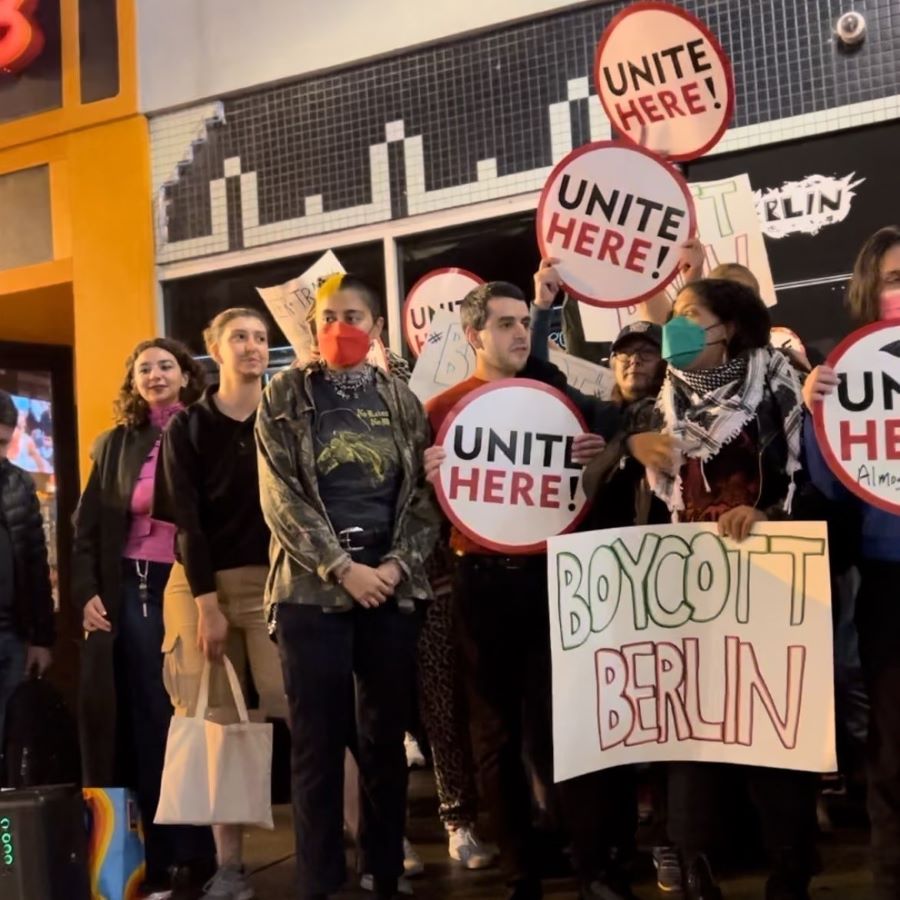On Nov. 20, 2023, the owners of the Berlin Nightclub in the Boystown neighborhood of Chicago decided to shut down the club after the workers formed a union with UNITE HERE Local 1 and repeatedly went on strike for better wages over the course of a few months. The workers struck because the owners, who had been cutting costs with low wages and no benefits, refused to negotiate a fair contract that would provide workers with improved pay and basic health care. The owners also spread misinformation that sowed divisions and catered to petty bourgeois elements in the queer Chicago community.
Former security staff member and union organizer Chelle Crotinger spoke with Liberation News. “Berlin could have been trying things out, if there was no dragging of the feet. There was no one holding the reins, and [the bosses] ultimately decided it was easier to cut the horses loose than to correct course,” they said.
Berlin’s owners claimed that the unionization drive was the cause of the shutdown. The owners released a letter on their website, which has since been removed, filled with misinformation. The letter claimed that the workers were asking for raises in pay and pension/health care for workers that would have cost the bar at least $500,000 per year. Crotinger responded to this claim by saying that the union received no financial information from the owners and that the union had to estimate demands while negotiating. “Even a dollar more than minimum wage could have gone a very long way,” Crotinger said, but added that the owners never came to the table to negotiate.
While the bar’s closing comes as a shock to both workers and patrons of the bar, the bosses only have to deal with a slight deficit. “They have their homes, their health insurance, their capital … most of us workers don’t have any of that now,” said Crotinger. The owners are also not part of the Boystown community and live in Michigan.
Crotinger also noted that Berlin workers were treated even worse than other Boystown bar workers, like those at Charlie’s Chicago where “even the drag queens clock in and have W-2s and are well taken care of: A model that, given the slightest amount of effort, could have been replicated at Berlin.” The capitalists at Berlin refused to offer basic health insurance or even slight increases above minimum wage.
Crotinger spoke of a divided queer community — a community that should treat service workers well instead of “seeing Berlin workers as an obstacle to getting drunk” and endangering and treating these underpaid workers with disrespect.
Other union drives at queer-oriented employers such as Howard Brown Health Workers United have continued in Boystown and across Chicago.

Crotinger said that the unionization effort “has helped us to learn who in our community is for our community,” and hopes that other bars will take a hint from the closure of a predatory business and work towards implementing more equitable practices for their workers. Even with the threat of community division, Crotinger says that Berlin workers have “support in the community … they’ve been doing very good at doing the work [to combat misinformation] so we have time to heal.”
Following the closure, Berlin workers have been sharing job leads each other and they have been well taken care of by UNITE HERE Local 1. Crotinger noted of themself that they are “not in a functioning union now, but very much a union guy and will always be that.” Crotinger hopes to support library workers, Howard Brown Health workers and other workers in Chicago. “We should not lose the progress we have made in our local fights … it’s about capitalizing on that ability when you have it. Do whatever you can, get others to show up, share what you can,” Crotinger said.
Feature photo: The queer working-class community comes together to organize for better wages for exploited Berlin workers. Liberation photo





